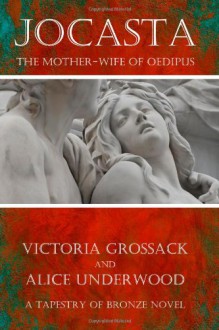


Jocasta falls just short of three stars for two reasons, which I’ll detail below.
First, a precis: The novel recasts the myth of Oedipus as told from the titular character’s point of view (hopefully, I shouldn’t have to recount the traditional version of the myth?). Though the authors have elected to largely abandon any supernatural elements, there’s the Tiresias (the prophetic mouthpiece of Apollo), who does seem to channel a divine will when she (he) utters her (his) dooms.[1]
The Tiresias prophesizes that fourteen-year-old Jocasta will be queen of Thebes and marry its most famous king. She is chosen for Alphenor, the heir-apparent to Thebes’ rulers Amphion and Niobe. But on the night of the betrothal, Niobe blasphemes, the Tiresias curses the family, and all but one of the royal children die. The next day, Amphion is torn apart by a mob, and Niobe goes mad. Jocasta and her family are at a loss, especially in light of the prophecy, but things soon appear to be looking up when Laius, a son of a former Theban king, returns from exile in Pelops’ city of Pisa (Olympia), claiming the throne and Jocasta. The night of the wedding things do go well. Jocasta falls in lust at the sight of Laius, and Laius reciprocates the feeling. But soon after the couple consummates the marriage the prophetess tells Laius that any son of his will kill him. The king attempts to repudiate Jocasta but he has no cause, and – of course – she’s already pregnant with Oedipus. Nine months later, the newborn is torn from Jocasta’s arms and Laius has it exposed, or believes that the man he sends to do it, has done it. The novel passes over the next twenty years quickly. Laius continues to send tribute to Pelops and, living in fear of conceiving a son, never touches Jocasta again. Though Laius proves a most inept king, Jocasta and her brother Creon rule the city, and make it prosperous despite the tribute.
The story picks up when Laius decides to consult the Delphic oracle. As in the traditional version, he meets an unrecognized Oedipus on the way to Delphi, there’s an altercation, and Oedipus kills him. Subsequently, Creon organizes a competition in Thebes to find a new husband for his sister: Whoever can answer the riddles of Melanthe, the Maenad high priestess, will become the next king of the city. Oedipus shows up to participate, and as with Laius, Jocasta is smitten at first sight. Because Oedipus is the supposed son of Corinth’s king and an alliance with that city would counter the power of Pelops, Creon conspires to ensure that the youth wins the contest.
Again, the next two decades are glossed: Jocasta and Oedipus rule an ever more fortunate Thebes, and they have four beautiful children: Antigone, Ismene, and the twins Eteocles and Polynikes. And then everything goes sour when Jocasta’s relationship with her husband comes out.
Why not three stars (or more)?
One reason is the writing. It’s just “meh” – competent but not particularly beautiful or elegant. And there are anachronisms that jar the reader out of the early Iron Age setting, making her wonder if a Mycenaean Greek would have actually said that.
I could have forgiven such clumsiness, however – as I have with other authors – if Jocasta had been a more compelling character, but she has no arc. The child of the first chapter is not all that different from the fifty-plus-year-old woman of the final chapter. Jocasta comes across as rather clueless and passive, particularly in the hands of her brother, whose personal ambitions, machinations and political acumen are what keep Thebes strong. I can accept that a fourteen-year-old girl, growing up insulated from the hurly-burly of politics, would be at sea when suddenly thrust onto center stage. But if I’m to continue to be interested in her at all, she has to show some maturation over the course of the twenty and forty years that the last two-thirds of the novel encompass. It’s difficult to see that in this version of Jocasta.
I was impressed by how the authors euhemerized the myth. It worked for me, though I’m still puzzled about the role of the Tiresias, the one ambiguously supernatural element. In the end, though, the book reads like a first or (at best) second draft. There’s a potentially interesting character in Jocasta, and you can see the glimmerings of potential in Cleon’s and Oedipus’ but they’re not drawn sufficiently well to make me recommend the book. On the other hand, if you like this genre (as I do), it may be just good enough to warrant a perusal.
[1] Tiresias is a title for the blinded person who speaks for Apollo. In the beginning, the post is held by an old woman. When she dies, her successor is Jocasta’s father, Menoeceus.